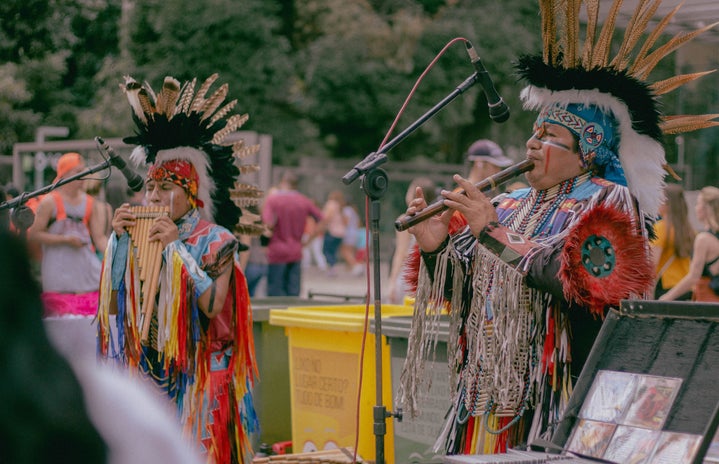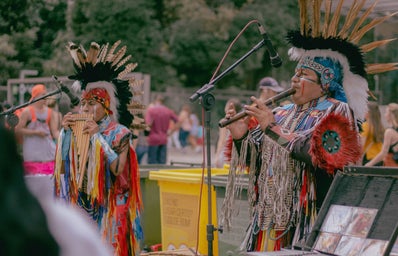Looking through the CU Boulder course catalog can be incredibly intimidating, stressful, and confusing. While my academic advisor has helped me select courses which apply to my major, when I found out I was missing a diversity credit for the general education part of my degree, I found myself aimlessly scrolling in search of the perfect class.
So, when I discovered ETHN 2703 / REL 2700, an Ethinic and Religious studies class on Native American and Indigenious Religious Traditions, I couldn’t register fast enough. As a direct descendent of the Objiwa tribe, I wanted to learn more about my roots, expand my religious knowledge, and understand the practices of those indigenious to North America, Canada, and Mexico. After a semester of taking Dr. Natalie Avalos’s course, I am absolutely blown away by how much I have learned and how highly I recommend this class to anyone else in need of a U.S Perspective Diversity credit.
Native Beliefs, Ceremonies, and Traditions
In ETHN 2703 / REL 2700, we read “Waterlily” by Yankton Dakota linguist, Ella Cara Deloria, and learned about many aspects of Dakota culture. I was exposed to concepts like kinship, the natural world, spiritual power, place names, and so much more. As a Westerner, whose ancestors colonized North America with the missionized goal of controlling native peoples and their land, I feel like approaching tribal belief systems with an open mind is the least I can do to atone for the brutal slaughter of millions of indigenous peoples since 1492. While some concepts in this course were difficult to grasp, like the importance of “stalking with stories,” I was introduced to a completely different aspect of religion and Native American history which made me not only appreciate indigenous cultures more, but also somewhat heal from the generational guilt and colonial trauma enforced by European settlers. I highly recommend enrolling in the Native American and Indigenous Religious Traditions class not only to expose yourself to a whole new perspective of religion, but also from a Western standpoint, learn to appreciate the cultures our ancestors nearly eliminated.
The Bigger Picture
Not only did this course challenge my Western understanding of religion, community, and the environment, but Dr. Avalos also connected the material to modern day forms of colonialism. We had discussions about toxic masculinity and how indigenous warrior society encourages vulnerability, the influence of capitalism and the patriarchy on Native American power struggles, and how white supremacy is a form of collective racial trauma and unresolved grief. I looked forward to recitation because our discussions were riveting and ranged from topics like Christianity to PTSD. We were encouraged to critically think and connect concepts learned in class to modern-day issues like the war between Russia and Ukraine, the Dakota Access Pipeline protests, and police brutality. One of the main take-aways from this course is that while white settlers are no longer actively burning down tepees, forcing native children to attend boarding schools, or creating treaties which devalue indigenious sovereignty, the impacts of colonization are more present than ever and native tribes from Mexico to Canada are still suffering from extreme oppression, forms of genetic PTSD, and embedded trauma. As a country, we still have countless apologies, ceremonies, and rebuilding to do before the balance of native american tribes is restored.
Course Load
One of the many factors when registering for a class is workload. Especially when taking a course which doesn’t directly apply to your major, students will opt for classes with minimal assignments, understanding professors, and reasonable grade boundaries. I not only attended ETHN 2703 / REL 2700 because of my genuine interest in the material, but also because for the first time in my college career my knowledge wasn’t defined by how well I performed on quizzes, essays, and exams.
Instead, Dr. Avalos designed a course where students were graded on participation and more often than not, there was no right answer. Each week we wrote a 200-300 word reflection on what we discussed in class and recitation, but only eight responses were required, due-dates were flexible, and grading was lenient. Basically, as long as you show up to class, listen, and turn in the required weekly responses, you will succeed in this class. While I personally like to be challenged academically, I really appreciated how little stress I felt throughout this semester. Thank you to both the TAs and Dr. Avalos for making learning fun, easy, and meaningful; this has been one of the best classes I have taken in my entire life.
Clearly, through her Native American and Indigenious Religious Traditions course, Dr. Natalie Avalos has sparked a deep interest of indigenous culture and has made me want to further explore my Objiwa roots. While I am only one student and cannot speak for all of my peers, ETHN 2703 / REL 2700 has completely changed my perspective on Westerners, religion, and the overall mistreatment of minorities not only in North America, but also across the world. I highly recommend this course, even if you don’t need a diversity credit, because learning about those who called this land home before white Europeans even “discovered” it is something all Americans should consider.


